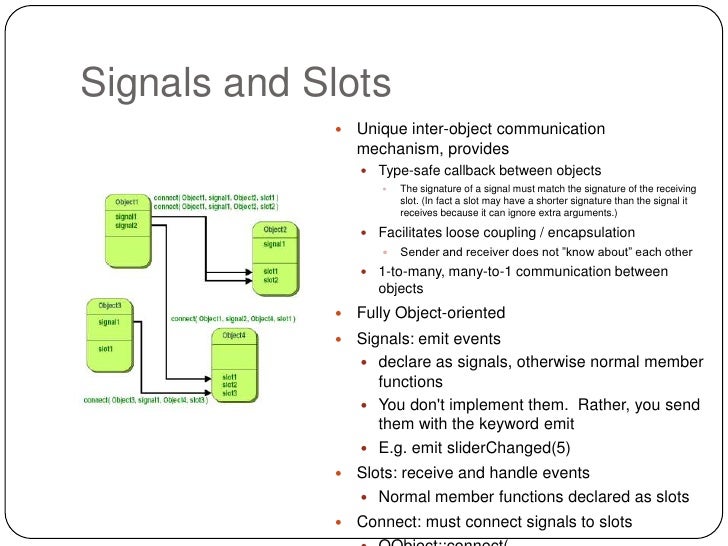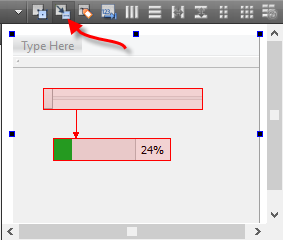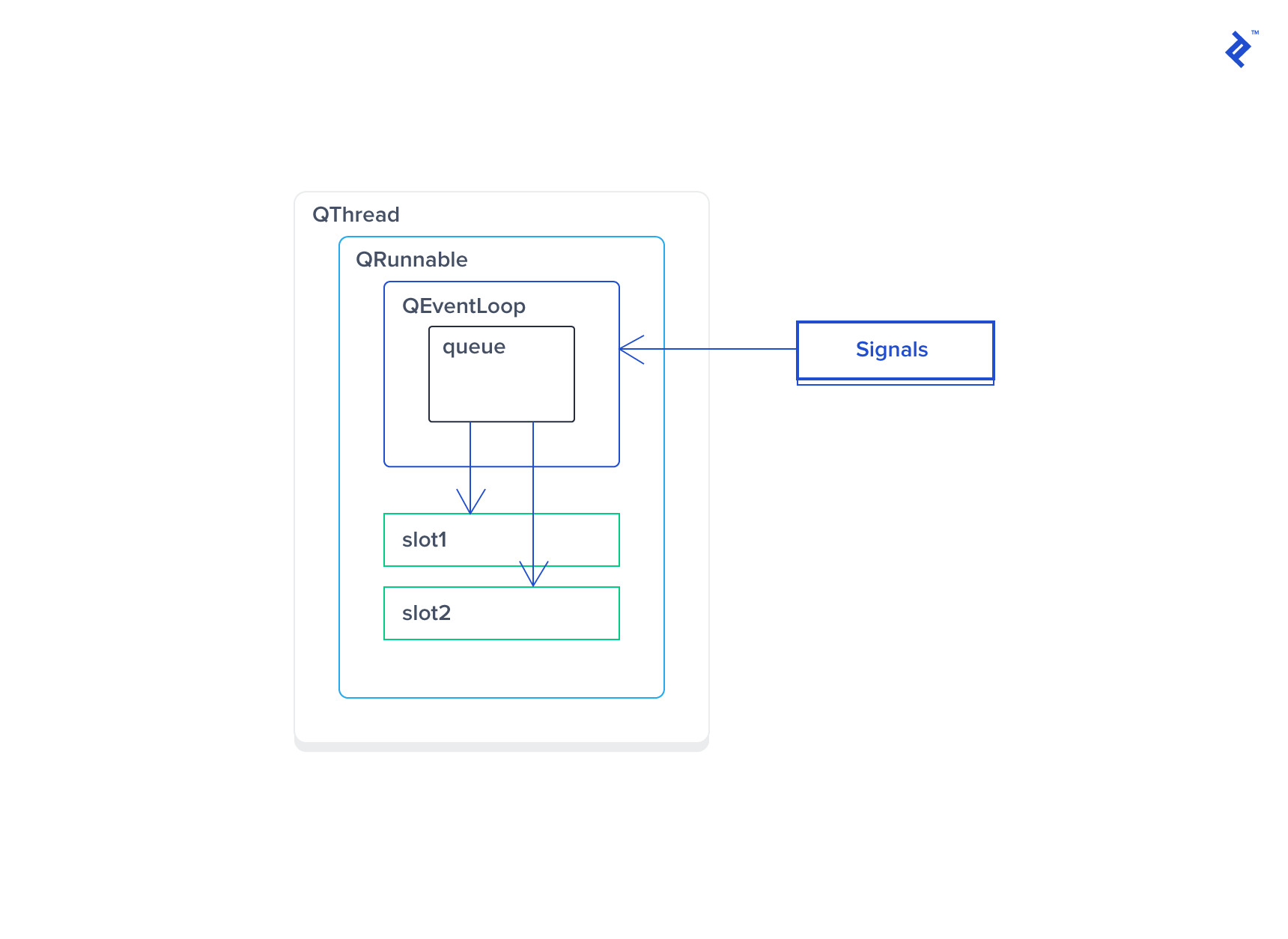Qt is well known for its signals and slots mechanism. But how does it work? In this blog post, we will explore the internals of QObject and QMetaObject and discover how signals and slot work under the hood. In this blog article, I show portions of Qt5 code, sometimes edited for formatting and brevity.
- Qt Signals And Slots Tutorial
- Qt5 Signals Slots Threads Double Diamond
- Qt5 Signals Slots Threads No Deposit
Hi People,
- Traditional syntax: SIGNAL and SLOT QtCore.SIGNAL and QtCore.SLOT macros allow Python to interface with Qt signal and slot delivery mechanisms. This is the old way of using signals and slots. The example below uses the well known clicked signal from a QPushButton.The connect method has a non python-friendly syntax.
- A long running operation has to be put in another thread. During the course of processing, status information should be sent to the GUI thread. Use QThread, reimplement run and emit signals as needed. Connect the signals to the GUI thread's slots using queued signal/slot connections. One call: Operations are to be performed on all items of a.
I have a problem with Qt meta-type system and the signal and slot connections.
I try to connect a signal and slot with each other. The signal looks like this:
@
signals: void sigSaveFileName(QString&);
@

and the slot:
@
private slots: void slotPutSaveFileName(QString& name);
@
Before I connect those, I would like register the QString with qRegisterMetaType() method then call connect method:
@
qRegisterMetaType('QString');
connect(&_worker, &Worker::sigOpenFileName, this, &MainWindow::slotPutOpenFileName);
@
If I run my application, I watch the application output, and I get the following warning:
QObject::connect: Cannot queue arguments of type 'QString&'
(Make sure 'QString&' is registered using qRegisterMetaType().)
QObject::connect: Cannot queue arguments of type 'QString&'
(Make sure 'QString&' is registered using qRegisterMetaType().)
and doesn't happen anything :(

Can tell me somebody what I make wrong?
Regards,
Norbert
Introduction
Remarks
Official documentation on this topic can be found here.

A Small Example
Signals and slots are used for communication between objects. The signals and slots mechanism is a central feature of Qt and probably the part that differs most from the features provided by other frameworks.
The minimal example requires a class with one signal, one slot and one connection: Skill based gambling legal advice.

counter.h
The main sets a new value. We can check how the slot is called, printing the value.
Finally, our project file:
Connecting overloaded signals/slots
While being better in many regards, the new connection syntax in Qt5 has one big weakness: Connecting overloaded signals and slots. In order to let the compiler resolve the overloads we need to use static_casts to member function pointers, or (starting in Qt 5.7) qOverload and friends:
Multi window signal slot connection
A simple multiwindow example using signals and slots.
There is a MainWindow class that controls the Main Window view. A second window controlled by Website class.
The two classes are connected so that when you click a button on the Website window something happens in the MainWindow (a text label is changed).

I made a simple example that is also on GitHub:
mainwindow.h
mainwindow.cpp
website.h
website.cpp Palms casino nightclubs biloxi.
Project composition:
Consider the Uis to be composed:
- Main Window: a label called 'text' and a button called 'openButton'
- Website Window: a button called 'changeButton'
So the keypoints are the connections between signals and slots and the management of windows pointers or references.

and the slot:
@
private slots: void slotPutSaveFileName(QString& name);
@
Before I connect those, I would like register the QString with qRegisterMetaType() method then call connect method:
@
qRegisterMetaType('QString');
connect(&_worker, &Worker::sigOpenFileName, this, &MainWindow::slotPutOpenFileName);
@
If I run my application, I watch the application output, and I get the following warning:
QObject::connect: Cannot queue arguments of type 'QString&'
(Make sure 'QString&' is registered using qRegisterMetaType().)
QObject::connect: Cannot queue arguments of type 'QString&'
(Make sure 'QString&' is registered using qRegisterMetaType().)
and doesn't happen anything :(
Can tell me somebody what I make wrong?
Regards,
Norbert
Introduction
Remarks
Official documentation on this topic can be found here.
A Small Example
Signals and slots are used for communication between objects. The signals and slots mechanism is a central feature of Qt and probably the part that differs most from the features provided by other frameworks.
The minimal example requires a class with one signal, one slot and one connection: Skill based gambling legal advice.
counter.h
The main sets a new value. We can check how the slot is called, printing the value.
Finally, our project file:
Connecting overloaded signals/slots
While being better in many regards, the new connection syntax in Qt5 has one big weakness: Connecting overloaded signals and slots. In order to let the compiler resolve the overloads we need to use static_casts to member function pointers, or (starting in Qt 5.7) qOverload and friends:
Multi window signal slot connection
A simple multiwindow example using signals and slots.
There is a MainWindow class that controls the Main Window view. A second window controlled by Website class.
The two classes are connected so that when you click a button on the Website window something happens in the MainWindow (a text label is changed).
I made a simple example that is also on GitHub:
mainwindow.h
mainwindow.cpp
website.h
website.cpp Palms casino nightclubs biloxi.
Project composition:
Consider the Uis to be composed:
- Main Window: a label called 'text' and a button called 'openButton'
- Website Window: a button called 'changeButton'
So the keypoints are the connections between signals and slots and the management of windows pointers or references.
The new Qt5 connection syntax
Qt Signals And Slots Tutorial
The conventional connect syntax that uses SIGNAL and SLOT macros works entirely at runtime, which has two drawbacks: it has some runtime overhead (resulting also in binary size overhead), and there's no compile-time correctness checking. The new syntax addresses both issues. Before checking the syntax in an example, we'd better know what happens in particular.
Let's say we are building a house and we want to connect the cables. This is exactly what connect function does. Signals and slots are the ones needing this connection. The point is if you do one connection, you need to be careful about the further overlaping connections. Whenever you connect a signal to a slot, you are trying to tell the compiler that whenever the signal was emitted, simply invoke the slot function. This is what exactly happens.
Qt5 Signals Slots Threads Double Diamond
Here's a sample main.cpp:
Qt5 Signals Slots Threads No Deposit
Hint: the old syntax (SIGNAL/SLOT macros) requires that the Qt metacompiler (MOC) is run for any class that has either slots or signals. From the coding standpoint that means that such classes need to have the Q_OBJECT macro (which indicates the necessity to run MOC on this class).
The new syntax, on the other hand, still requires MOC for signals to work, but not for slots. If a class only has slots and no signals, it need not have the Q_OBJECT macro and hence may not invoke the MOC, which not only reduces the final binary size but also reduces compilation time (no MOC call and no subsequent compiler call for the generated *_moc.cpp file).